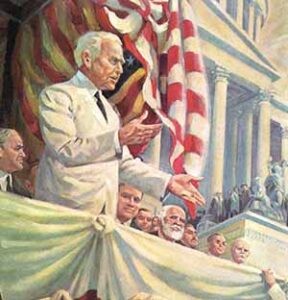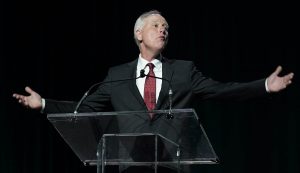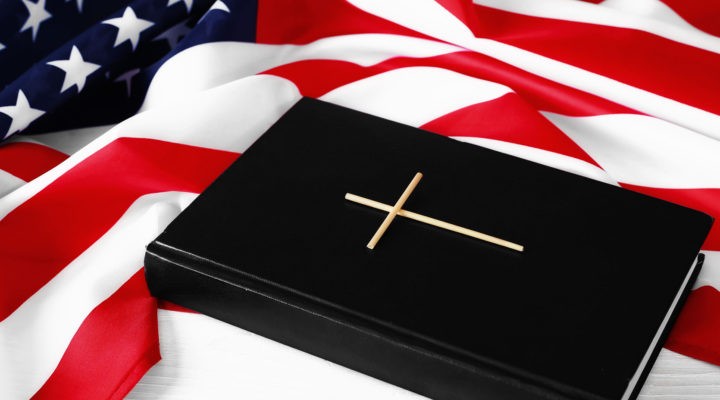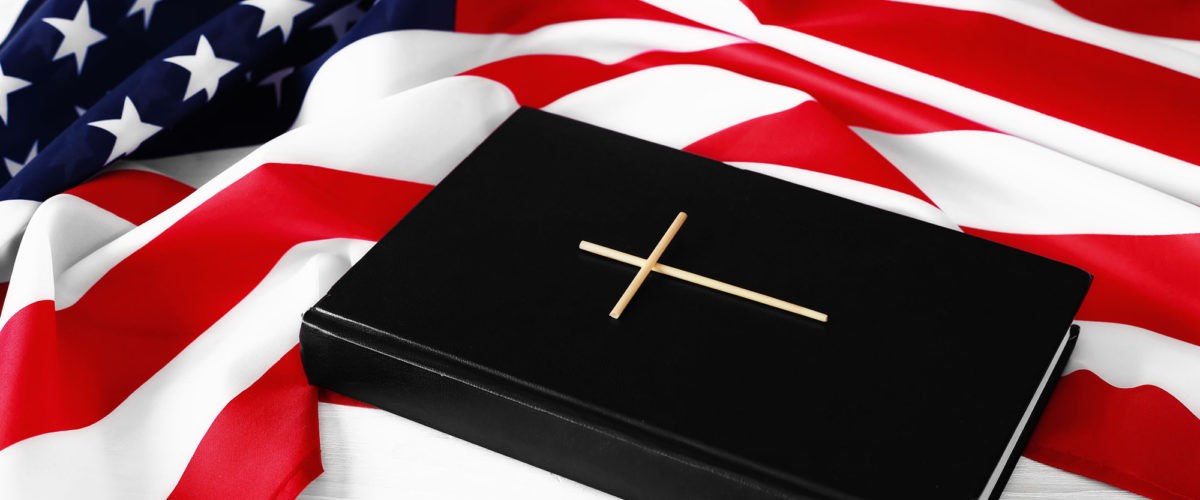Christian nationalism: Does such a thing exist? If it does, what is it and how did it emerge? Is it a threat? How should we respond to it?
To answer these questions, I do not offer a political treatise representing partisan politics. The motivation is theological and ecclesiological, not political. However, as is sometimes the case, a careful review of our faith and tradition requires us to reassess how we engage with the public square. So there is no avoiding political inference and implication.
There are times when the ways of God’s reign are at cross purposes with the ways of worldy systems of governance.

Ronald Cava
To paraphrase Leonard Sweet and Frank Viola, Jesus is not the chaplain for any political party. Neither the left nor the right holds a patent on the influence or power of Jesus. Jesus did not come to establish a political utopia on earth. They quote Origen who said, Jesus is autobasilia, that is Jesus himself is the kingdom.[i]
This offering represents my deep convictions as a Christian, a Baptist and an American, in that order. It is based on my reflections from Scripture and theology, secular and Christian history, and specifically in light of our Baptist heritage and distinctives.
At heart, this is my humble pastoral effort to educate and elucidate our congregation about this issue. In so doing, I hope to inspire us, as Baptist believers, to reassert our longstanding and historical allegiance to the ideals of complete religious liberty for all people and to the sound principles of the separation of church and state.
Introduction
I first began receiving questions about Christian nationalism during the 2016 election season. I began to craft a response at that time but decided the threat was not severe and addressing it would threaten the stability of our congregation. I was wrong. This is a Jesus moment in America.
“I decided the threat was not severe and addressing it would threaten the stability of our congregation. I was wrong.”
Michael “Chip” Rotolo grew up here at First Baptist Church. He has quickly made a mark as a thoughtful and respected research specialist at the Pew Research Center. Pew is a trusted, nonpartisan, nonpolitical, nonadvocacy think tank. Their mission is “to inform, not prescribe.” Their founding documents say, “Fact-based information is the fuel democracies run on — the raw material from which societies identify problems and construct solutions.” Their work often examines religious and faith-based issues.
Rotolo recently collaborated on a report titled “Christianity’s Place in Politics and Christian Nationalism.” In this fine report, Pew revealed: “An overwhelming majority of Americans — 83% — say the government should not declare Christianity the official religion of the country. Only 13% of Americans support declaring Christianity as the national religion.”[ii]
Yet nearly every day we are hearing of new legislation or edicts from politicians that seem contrary to that opinion. The current speaker of the House, Mike Johnson, envisions himself as the new Moses, who will lead America out of bondage. Television pastors and other religious celebrities populate their books, sermons and social media posts with content that marks them as Christian nationalists.
These discrepancies between majority American opinion and political currents are indicative of the threat of Christian nationalism.

Edwin Hearne’s painting of George W. Truett delivering his 1920 address “Baptists and Religious Liberty” is part of the Eight Great Moments in Baptist History series. (SBHLA Image)
What is Christian nationalism?
We first need to ask, what is “nationalism”? Nationalism, on its own, is not a bad thing. Properly understood, nationalism is nothing more than the sharing of a set of values and a common love for one’s own country of habitation.
Nationalism, thus understood, provides the glue that holds together civilized societies. It does not imply that everyone must think or believe alike. Nor does it mean new neighbors coming from other countries must abandon sincere expressions of their native culture. It does mean, for us as Americans, that all of us in this vast and increasingly pluralistic society can love our country and be loyal to it without disenfranchising one another.
“All of us in this vast and increasingly pluralistic society can love our country and be loyal to it without disenfranchising one another.”
Nationalism, as such, is rather generic. However, like anything else, nationalism has been and can be subjected to extremism.
We must be wary, for instance, of it morphing into ethnic or racial nationalism as it has throughout history. We must not forget the lessons of the two world wars, when the catalyst for so much suffering was the ideal that a specific ethnic race of people was superior to all other races.
Nor should we neglect more recent manifestations such as the Jim Crow era of American history, when people of color were regarded as less than fully human and therefore not fully celebrated and integrated citizens of this United States of America.
This is a terrible stain upon our history, and not fully faded.
It is quite possible to be both a good Christian and a good citizen of one’s country. It is equally possible for a Muslim, Jew, agnostic or atheist to be a patriotic and loyal citizen. People of faith need not abandon our patriotic fervor. We should, however, guard against blurring the lines between our patriotism and our commitment to the reign of God. Such confusion violates the basic tenets of our faith and empties Christ of his Lordship.
The lines blur when we fail to discriminate between being a nation where only Christian values and practices are respected and enshrined into law versus being a nation where Christian practices are protected, but not at the expense of the freedom of others to practice faith in different ways or to practice no faith at all. For this reason, Baptists have historically been staunch defenders of absolute religious liberty for all people.
We should resist all forms of nationalism that devalue the life, liberty and pursuit of happiness for any of our neighbors. We should be particularly vigilant when religious beliefs, practices or affiliations become the litmus test for our liberty.
Now we move to a clearer definition of “Christian nationalism.” Christian nationalism does cross some of those lines and does violate some precious principles of people who claim to be citizens of a city not made with human hands, eternal in the heavens, “whose architect and builder is God.” Christian nationalism confuses the eternal city of God with the capital cities of this world.
“Christian nationalism confuses the eternal city of God with the capital cities of this world.”
Consider a different understanding, one that is ancient. One of the charges leveled against the earliest Christians was that of sedition against the Roman empire because they were known to speak of and pray for the coming kingdom of God and refused to recognize Caesar as Dominus et Deus (Lord and God). Justyn Martyr wrote, in their defense,
And when you hear that we look for a kingdom, you suppose, without making any inquiry, that we speak of a human kingdom; whereas we speak of that which is with God, as appears also from the confession of their faith made by those who are charged with being Christians, though they know that death is the punishment awarded to him who so confesses. For if we looked for a human kingdom, we should also deny our Christ, that we might not be slain; and we should strive to escape detection, that we might obtain what we expect. But since our thoughts are not fixed on the present, we are not concerned when men cut us off; since also death is a debt which must at all events be paid.[iii]
Justin went on to distinguish between the Christian commitment to God and earthly rulers.
And everywhere we, more readily than all men, endeavor to pay to those appointed by you the taxes both ordinary and extraordinary, as we have been taught by him; for at that time some came to him and asked him, if one ought to pay tribute to Cæsar; and he answered, ‘Tell me, whose image does the coin bear?’ And they said, ‘Cæsar’s.’ And again, he answered them, ‘Render therefore to Cæsar the things that are Cæsar’s, and to God the things that are God’s.’ Whence to God alone we render worship, but in other things we gladly serve you, acknowledging you as kings and rulers of men, and praying that with your kingly power you be found to possess also sound judgment.[iv]
Christian nationalists, unlike the earliest Christians, conflate being a Christian with being a patriot. They imply that non-Christians are not capable of being patriots. They imply, and some will explicitly state, that to be a truly good American one must be a Christian.
They assert further that to be a truly good Christian in America one must fight to ensure American laws are neatly aligned with Christian doctrine. Christian nationalists believe Christianity should be the “preferred religion” of the state — so they demand Christian symbols be erected on public (civil) property and that laws, such as those governing who may and may not marry, be passed.
They are more concerned with having a majority of Supreme Court justices who will uphold and protect their Christian privilege than they are with whether those judges will objectively interpret the Constitution and apply precedent to their decisions, without violating the precious protection of religious liberty.
“When they speak of wanting to return public prayers to public schools they mean only Christian prayers.”
When they speak of wanting to return public prayers to public schools they mean only Christian prayers. They forget that there was a lot of praying going on in schools when segregation was the rule of the day, but those prayers did not fight legalized discrimination. Public prayer in school is certainly not the panacea many Christian nationalists purport it to be.
Fear has fertilized the seed of Christian nationalism in America. Churches are struggling. Christian influence has waned. Social sensitivities have shifted. Many people of faith feel much has been lost, and they fear losing more.

Paul Baxley
But as Paul Baxley, says, “The church of Jesus Christ exists by the power that parted the Red Sea and raised Jesus from the dead, and that power and authority is still at work within us and among us even as empires rise and fall. To suggest that the church needs the protection of the state in order to flourish and thrive is idolatrous.”[v]
Amen! Reliance upon government to advance the cause of Christianity belies a lack of trust in God to provide for the church. It denies that the kingdom of God already is present and is coming on earth as in heaven and that it is dramatically different from any past, present or future kingdom of the world.
We attribute the genesis of our Baptist aversion to mixing the powers of the state and the church to one of our founders, Thomas Helwys. Helwys was imprisoned by King James of England for daring to dissent against the Church of England, for practicing baptism outside of the Church of England, and for questioning the king’s attempts to dictate religious terms for his citizens.
At great peril to his life, Helwys wrote an extended defense to the king. His preface said:
Let the King judge, is it not most equal that men should choose their religion themselves, seeing they only must stand themselves before the judgment seat of God to answer for themselves, when it shall be no excuse for them to say, we were commanded or compelled to be of this religion by the king or by them that had authority from him.
Coerced faith is no faith at all. Our Baptist forbearers understood this. They believed humans are accountable only to God in matters of the soul.
“Coerced faith is no faith at all.”
Christian nationalism, however, co-mingles the blood of Christ, shed for the sins of all humankind, with the blood that has been shed by those who have defended our sovereign national interests. It fails to recognize, as my colleague David Stratton says, that “Jesus died, not with the sword of government in his hand, but with the spear of government in his side.”
Christian nationalism wraps the Cross in a flag and thereby suggests America has replaced biblical Israel as God’s chosen people. This is poor theology and comes dangerously close to idolatry.
Where did Christian nationalism come from?
Our second question is how did Christian nationalism arise? Before the Protestant Reformation, and still today in places like Great Britain, the lines between governmental and religious authority are blurred. In Martin Luther’s Germany, princes held more power over the church than the pope. In Great Britain, it is the archbishop of the Church of England who anoints new kings or queens. Kings or queens reign as the official head of the Church of England. Americans never have tolerated such a fusing of church and state. Our founders were running from it. Colonial Baptists were persecuted for refusing to pay taxes for the support of the Anglican Church, or for refusing to have their infant children baptized.

Soren Kierkegaard
A similar threat plagued Denmark at the time Søren Kierkegaard was warning Christians about “Christendom,” the rule of God wrapped in the flag of the nation. There, the Lutheran Church was the state-sanctioned church. So intertwined were the two that vast numbers of people had come to believe that one who was born Danish was automatically a Christian.
Kierkegaard argued that if such a belief continued, which fully institutionalized Christianity, then Christianity as a true religion of faith from the soul would soon disappear.
So, we see that Christian nationalism is not new, nor is it a uniquely American problem. It is, however, an increasing threat in America.
In some ways this is understandable. Otherwise reasonable, rational and faithful people sometimes allow fear to change them. Many Americans fear America could, theoretically, one day have a majority Muslim population and therefore become subject to Sharia Law. So, as illogical as it is, these people opt to establish a Christian state for fear of being subjected to a different sort of religious state. Let’s do it to them before they can do it to us!
“American Christian nationalism then, is about replacing democracy with theocracy.”
American Christian nationalism then, is about replacing democracy with theocracy. The majority gets to decide which god and which of that god’s adherents get to head the theocracy. In practice, this would require that all civil law be aligned with Christian doctrine.
Baptists and Christian nationalism
The Moral Majority movement, started by Jerry Falwell Sr., was a hotbed for the emergence of Christian nationalism. Religious figures such as his son, Jerry Falwell Jr., and pastors such as Robert Jeffress of First Baptist Dallas, while they may not refer to themselves as such, are Christian nationalists.

Jerry Falwell, Nov. 11, 1980 (Getty Images)
Falwell at the time was an independent Baptist, but he found a strong alliance with the emerging fundamentalist leaders of the Southern Baptist Convention and many from charistmatic churches. Many presidents of the SBC fought to dismantle historic Southern Baptist colleges and seminaries while simultaneously serving as trustees of Falwell’s Liberty University. Falwell found a foothold in the SBC, and the fruits of that influence have grown unabated.
These pioneers of Christian nationalism saw little difference between worshipping the God of the Bible or waving an American flag in their sanctuaries. In the 1970s, Falwell began to galvanize political influence by holding “I Love America” rallies. He proclaimed an odd mix of revivalism and Americanism while surrounded by American flags. I never have seen a picture of one of those rallies with a Cross anywhere in sight.
“These pioneers of Christian nationalism saw little difference between worshipping the God of the Bible or waving an American flag in their sanctuaries.”
I recall Southern Baptists in the 1980s conducting “simultaneous revivals” (all SBC churches were urged to hold revival meetings on the same dates for a full seven days) and the theme was “Here’s Hope America.” All the promotional materials, including worship bulletin covers and lapel pins in the shape of a heart, the stars and stripes in the background, and a cross in the center. I even had one.
Now, I freely pledge my allegiance to our flag. I still get chill bumps whenever I hear our National Anthem. But the soul of a person and the sanctuary of the church always should operate under the banner of the Cross, singing, “Come Thou, Almighty King.”
Early on, these progenitors of Christian nationalism held that public officials should be bastions of Christian morality and character. But over time they became more mercenary, willing to sell their votes to the highest bidders, whether they were saints or scoundrels. Anyone would do, so long as they advanced their cause of turning America back to Christendom (not Christianity — the two are vastly different).
A cornerstone of this movement is that the Christian religion (especially the fundamentalist version) deserves protection and privilege. Implied, for certain, is that the protection and privilege of other faith expressions are not so important or deserving.
In its most extreme and dangerous forms, Christian nationalism gives birth to the sort of damnable theology and practices of groups such as Westboro Baptist in Topeka, Kan. Some would argue it fosters contempt and hatred of the sort that precipitates many of the mass shootings that have plagued America.
“No movement that generates hatred or violence can be called Christian, for hate cannot be of Christ.”
In all fairness, it is the same mentality that radical Islamicists possess, motivating them to exterminate not only Christians but also other Islamic people of varying sects. One thing is certain; no movement that generates hatred or violence can be called Christian, for hate cannot be of Christ.

Bill Leonard
Bill Leonard, one of the brightest Baptist historians of our generation, has pointed out a more disturbing connection. Leonard confronts an extreme expression of Christian nationalism known as The Seven Mountain Mandate. It is a Pentecostal/charismatic driven movement that calls for Christian dogma to dominate culture, law and politics. Leonard notes:
The mandate promotes America as a country in which Christianity should be the nation’s primary (and privileged) religious tradition, its conservative principles the law of the land, and its lawmakers solidly in control.
The Seven Mountain approach includes an emphasis on the role of “prophets” said to receive revelatory communication from the divine, including certain directives to be politically levied upon Christians and non-Christians alike.
Leonard wisely encourages us to reject such notions and hold fast to the wisdom of giants from the past, like Roger Williams who said, “An enforced uniformity of religion throughout a nation or civil state, confounds the civil and religious, denies the principles of Christianity and civility, and that Jesus Christ is come in the flesh.”
Agreeing with Williams, Leonard concludes that movements like the Seven Mountains are “heretical, blasphemous, seditious and dangerous” and should be shunned by individuals, churches and the state.[vi]
A better Baptist way
This drives us to an important question. Will we make room for, protect and celebrate fellow Americans and patriots who happen not to be Christians, and who may embrace a faith tradition other than Christianity? This is not so different a question than we wish would be asked in places like Iraq. Will Iraq ever embrace and celebrate all Iraqis, whether they are Muslim or not?
The Baptist Joint Committee for Religious Liberty, the Cooperative Baptist Fellowship, the United Methodist Church, the Evangelical Lutheran Church, American Baptist Churches in the USA and a significant collection of other individuals and bodies have voiced concern about, and opposition to Christian Nationalism.[vii] They forged the following statement:
As Christians, our faith teaches us everyone is created in God’s image and commands us to love one another. As Americans, we value our system of government and the good that can be accomplished in our constitutional democracy. Today, we are concerned about a persistent threat to both our religious communities and our democracy — Christian nationalism.
Christian nationalism seeks to merge Christian and American identities, distorting both the Christian faith and America’s constitutional democracy. Christian nationalism demands Christianity be privileged by the State and implies that to be a good American, one must be Christian. It often overlaps with and provides cover for white supremacy and racial subjugation. We reject this damaging political ideology and invite our Christian brothers and sisters to join us in opposing this threat to our faith and to our nation. As Christians, we are bound to Christ, not by citizenship, but by faith.[viii]
“Baptists should reject Christian nationalism because it is idolatrous and because Christian nationalism violates important mandates of holy Scripture.”
Baptists should reject Christian nationalism because it is idolatrous and because Christian nationalism violates important mandates of holy Scripture. It also violates our tradition as Baptists of fighting not only for our religious freedom but for the freedom of all people to practice or not practice faith as they see fit, without any interference from human authority or institutions.
Baptists in America have long been champions of the separation of church and state. Only in the past 30 years has that changed. There would have been no protections for religious liberty in our country’s founding documents had it not been for the influence of Baptist thinkers and politicians.
Baptists at the founding of our nation led the charge in demanding that the new America have no official church-state and that the state should not prefer or protect one religion at the expense of another. The state should neither compel nor infringe upon religious participation. These protections have made it possible for there to be a free church in a free state.
That is crucial, lest the church forgo her prophetic right to evaluate and speak truth to power, regardless of which party has the power.

Thomas Helwys
Some would have us believe contemporary moderate or progressive Christians have invented this notion that the state and church should not be intertwined. The writing of Thomas Helwys in 17th-century England shows otherwise. Helwys, widely acclaimed as one of the progenitors of the Baptist faith, was imprisoned by King James I for his radical ideas. The preface to a letter he wrote the king is the germ of the ideal of the separation of church and state that eventually was championed by Baptists in America as our Constitution was being crafted. Helwys wrote:
For our lord the king is but an earthly king, and he has no authority as a king but in earthly causes. And if the king’s people be obedient and true subjects, obeying all human laws made by the king, our lord the king can require no more. For men’s religion to God is between God and themselves. The king shall not answer for it. Neither may the king be the judge between God and man. Let them be heretics, Turks, Jews, or whatsoever, it appertains not to the earthly power to punish them in the least measure.[ix]
Unfortunately, our Baptist commitment to the defense of total religious liberty and the separation of church and state has been on the decline since the late 1970s. Mark Gaskins presented an excellent overview of the decline in defense of religious liberty and the separation of church and state among Southern Baptists in a paper he presented at the Oxford Roundtable in 2007. He charted major shifts in attitudes expressed by emerging fundamentalist leaders of the SBC. He recalled the fierce defense of earlier SBC leaders like George W. Truett who said,
Baptists have one consistent record concerning liberty throughout all their long and eventful history. They have never been a party to oppression of conscience. They have forever been the champions of liberty, both religious and civil . . . . Our fundamental essential principles have made our Baptist people . . . to be the unyielding protagonists of religious liberty, not only for themselves, but for everybody else as well.”
Gaskins compared that to the ludicrous statement by W.A. Criswell, Truett’s successor at First Baptist Dallas. Criswell was a leading architect of the takeover of the SBC, who said that the idea of the separation of church and state was a notion made up “by some infidel.”
More recently, Speaker of the House Johnson, a practicing Southern Baptist, was quoted as saying, “Over the last 60 or 70 years, our generation has been convinced that there is a separation of church and state. … Most people think that is part of the Constitution, but it’s not.”[x]
Who shall we believe? Truett or Criswell and Johnson? I choose Truett. His defense of religious liberty and the separation of church and state stands consistent with the long trajectory of Baptist history and heritage.
Gaskins went on to compare resolutions the SBC adopted into the 1970s, which were unwavering in the insistence upon religious liberty and the separation of church and state, with more recent resolutions that have softened, distorted or broken rank with the historic position of the majority of Baptists peoples in America. He concluded:
Since the fundamentalist shift that took place in the 1980s and 90s, the political right has heavily courted the religious right, especially Southern Baptist leaders. One cannot help but ask whether this majority status and access to political power have converged with the influences of Reconstructionism and Falwell to set the stage for what has been at best a shift in emphasis and at worst a radical departure from the Baptist heritage of support for religious liberty and separation of church and state.[xi]
This breakdown in the Baptist defense of total religious liberty and of strict separation of church and state is lamentable. Baptists should reclaim the historical precedent and climb back into the leadership role. Doing so will require us to reject Christian nationalism.
“Our resistance to Christian nationalism should emerge from our commitment to the mandates and teachings of the Bible.”
More importantly, our resistance to Christian nationalism should emerge from our commitment to the mandates and teachings of the Bible. The clear call of Scripture is not to merge our faith with civil government, but to respect civil government when it is respectable, to resist it when it is unjust, and never consider it as our Lord or Savior. Anything less fails to honor the lordship of Christ and the spirit of pilgrim faith.
Consider the words of the Apostle Paul: “Do nothing from selfish ambition or conceit, but in humility regard others as better than yourselves. Let each of you look not to your own interests, but to the interests of others. Let the same mind be in you that was in Christ Jesus.”
Beginning there, the great teacher goes on to describe the radical humility that characterized our Lord when he walked on earth. I will call upon the wisdom shared by a colleague in our personal conversation about this matter.
That same humility must characterize his followers. We cannot have the same mind as Christ Jesus if we regard ourselves as better than others, no matter what they believe. On the contrary, our minds are aligned with Christ and his revolution advances as we regard others as better than ourselves. We cannot have the same mind as Christ Jesus if we elevate our own interests above the interests of others, even if we claim to do so in the name of Christ. On the contrary, being likeminded with Christ means elevating the interests (well-being) of others above our own. Christian nationalists are, no doubt, well-meaning, yet they unknowingly attack the foundation of Christian thinking by inadvertently rejecting the mind of Christ. I do not believe they intentionally do damage to the gospel of Jesus Christ, yet this does not change the reality that they are, in fact, doing such damage.
Also, in Philippians, we are reminded that our primary citizenship is not as Americans, but as God’s people: “But our citizenship is in heaven, and from it we await a Savior, the Lord Jesus Christ.”
As such, we are not to “love the world or the things in the world. The love of the Father is not in those who love the world; for all that is in the world — the desire of the flesh, the desire of the eyes, the pride in riches — comes not from the Father but from the world. And the world and its desires are passing away, but those who do the will of God live forever.”
The book of Revelation, when read with sensitivity to its historical context and original meaning, is a warning against Christians deferring to government for the sake of protection and against the church giving away her spiritual birthright in exchange for freedom from the persecution of the empire: “Come out of her, my people, so that you do not take part in her sins, and so that you do not share in her plagues; for her sins are heaped high as heaven, and God has remembered her iniquities.”
These words were addressed to a generation of Christians who were being forced to declare that Caesar was lord. Yet they remembered the admonition of Jesus to render only unto Caesar what rightly belongs to Caesar, and that is not lordship.
Yes, Scripture does call on Christians to respect and be subject to the ruling authorities. But not at the expense of our conscience or in a manner that would confuse our allegiance to King Jesus with any earthly allegiance we may hold.
“The refutation of Christian nationalism then is a prophetic act of defiance by those whose highest allegiance is to the kingdom of God and whose great trust is in the power of God.”
The refutation of Christian nationalism then is a prophetic act of defiance by those whose highest allegiance is to the kingdom of God and whose great trust is in the power of God. As Russell Moore, editor of Christianity Today, has said, “A religion that needs state power to enforce obedience to its beliefs is a religion that has lost confidence in the power of its deity.” And: “Our end goal is not a Christian America, either of the made-up past or the hoped-for future. Our end goal is the kingdom of Christ, made up of every tribe, tongue, nation and language.”[xii]
The rejection of Christian nationalism does not imply that we should check our faith luggage at the gateway to the public square. It does, however, mean we will not ask or require others to check their baggage before they can fly with us. We must guarantee that all Americans will remain free to follow the dictates of their hearts regarding religious affiliation, whether they be Christian, Jew, Muslim or followers of many different traditions, or be they agnostic or atheist.
Two steps further
Yes, we should reject Christian nationalism. We also should reject any other form of religious influence that would threaten to hijack the total religious freedom of American citizens. We are fortunate, in my opinion, to live in a representative republic where people of all religions or no religion are free to love America, but never allowed to subvert America to their particular brand of religion. We do not need a theocracy.
Further, while rejecting Christian nationalism and other theocratic forms of government we also should reject secularism. Secularism, in its extreme form, is a cult of its own. It would drive all free expression of religion from the public square.
I do not concur with anyone who suggests Christians are being persecuted in America. But I do agree there is a growing anti-religious bias afoot in America. Some would argue Christians have brought this upon themselves through their explicit or implicit support of racism, classism and sexism. I find it ironically bigoted for secularists to seek the eradication of religion because some religious people are bigoted and because that bigotry is a threat to diversity and pluralism. Religious freedom and separation of church and state never should be perverted to exile God or church from our country.
Conclusion
Christian nationalism poses a clear and present threat to freedom of religion and the separation of church and state. Defeating theocracy safeguards the boundaries and distinctions between being in the world (fully and faithfully participating in the civil and secular society) and not being of the world (by maintaining our spiritual independence from government interference) as we keep on marching to Zion, the beautiful city of God.
Rejecting Christian nationalism does not imply leaving our faith at home or church when we enter the public square. It does not release us from an obligation to be the salt and light of the world in our civic actions.
Rejecting Christian nationalism liberates us to declare the gospel in word and deed, apart from external coercion. It honors and respects the beliefs and practices of those outside of Christianity, without threatening our transparency and authenticity as Christians. It upholds our history as Christians, and especially as Baptists. It keeps Christ on the throne and helps us identify and resist pretenders to his throne.
Russell Moore has eloquently summarized the task and challenge before us:
We can learn to be pilgrims again, uneasy in American culture, as we should have been all along. But we are not pilgrims cringing in protective silos, waiting for the sound of trumpets in the sky. We are part of a kingdom, a kingdom we see from afar (Hebrews 11:13) and a kingdom we see assembling itself all around us in miniature, in these little outposts of the future called the church.[xiii]
Ronald S. Cava serves as senior minister at First Baptist Church of Henderson, N.C. This article originally was written as a pastoral letter to his congregation.
Related articles:
This Fourth of July, let us reclaim patriotism | Opinion by Mark Wingfield
Church, state and the ‘Christian agenda’ | Opinion by Bill Leonard
Christian nationalists are misguided Christians, Anthea Butler says
Christian nationalism: How evangelical Christianity became a political religion | Analysis by Alexander Lang
[i] Sweet, L. & Viola, F., Jesus Manifesto: Restoring the Supremacy and Sovereignty of Jesus Christ, p. 104)
[ii] https://www.pewresearch.org/religion/2024/03/15/christianitys-place-in-politics-and-christian-nationalism/
[iii] Justyn Martyr, What Kingdom Christians Look For, New Advent, http://www.newadvent.org/fathers/0126.htm
[iv] Ibid.
[v] Paul Baxley, Endorser, Christians Against Christian Nationalism, https://www.christiansagainstchristiannationalism.org/endorsers
[vi] Bill Leonard, Would Today’s Christian Nationalists Exile Roger Williams – again?, https://baptistnews.com/article/would-todays-christian-nationalists-exile-roger-williams-again/
[vii] Full list of endorsers found at https://www.christiansagainstchristiannationalism.org/endorsers
[viii] https://www.christiansagainstchristiannationalism.org/statement)
[ix] Thomas Helwys, A Short Declaration of the Mystery of Iniquity (1611/1612), ed. Richard Groves (Macon, GA: Mercer University Press, 1998), p. 53
[x] https://time.com/6329207/speaker-mike-johnson-christian-nationalism/
[xi] Mark Eric Gaskins, Cracks in the Wall? Changing Attitudes toward the Separation of Church and State among Baptists in the United StatesPrepared for presentation at the Oxford Round Table on “The Separation of Church and State: The Decline and Fall?” July 22-27, 2007
[xii] Russell Moore, Onward: Engaging the Culture without Losing the Gospel
[xiii] Ibid.


